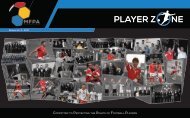MFPA Player Zone Magazine #4
Create successful ePaper yourself
Turn your PDF publications into a flip-book with our unique Google optimized e-Paper software.
Player Zone 2019 Player Zone 2019
The report noted some very positive aspects of the current Youth Academy
operation, including:
The ratio of coaches to players (on average 8:1), was deemed optimal in
order to find a good balance between team and individual development.
Club’s identity and objectives are well documented.
Roles and responsibilities are adequately documented in the club. It is
clear who is responsible and accountable for the key aspects of the club
management.
MFPA has for a number of years been advocating for data driven changes
in youth development. This year it has embarked on a new project which saw
it financing an elaborate assessment for one of Malta’s foremost football
academies. Birkirkara Youth Academy was chosen for this pilot project. MFPA
hired Double Pass, an organisation that assesses and advises football clubs,
leagues and (con)federations on optimising their talent development. The
Double Pass methodology has been implemented worldwide by different
federations and leagues, including Belgium, Denmark, England, Germany,
Japan, Scotland and the USA.
The study focused solely on the youth academy which includes players
aged between 5 and 17 years old. Over the course of months, Double Pass
assessed the various aspects of the organisation by analysing documents,
carrying out interviews with Parents, Administrators and Coaches, as well
as via surveys. In the end MFPA and Birkirkara Academy were presented
with a report on the findings, and key recommendations.
DID YOU KNOW?
That the applicable income tax rate for
professional players and coaches in Malta is 7.5%.
The report also made a number of recommendations namely:
The Club’s future objectives should be supported by short and long-term
objectives providing measurable objectives.
The Club should provide coaches with a more detailed, age specific
guidelines and exit standards. These should explain what is expected from
each team technically, tactically, physically and mentally and will provide
more tangible learning objectives for coaches to work towards.
The club should set clear principles on minimum playing opportunities in the
different age groups and should consider providing equal playing time for all
the players in the youngest age groups.
It is important that someone is responsible for coach development in the
club and adequate resources are available for this work.
The report also shed light on the practical lack of space for training which
is a challenge that is faced by most clubs in Malta, with most of the age
groups training on only 1/4th of a pitch.
This study was aimed at providing practical and tangible recommendations
for the development of youth academies. The footballing landscape is
changing rapidly with more foreigners being fielded on the pitch and with big
local clubs wanting to win at all costs. This is being translated into a growing
gap between the youth and the senior teams. More empirical research
by professional experts should be carried out throughout all of Malta’s
academies. However, having such data is only the beginning. Academies
should then strive to meet all the recommendations made in order to start
seeing real progress.
MFPA will continue seeking out ways to help the youth sector in Malta.
Special thanks to Jonathan Barbara and Mark Bondin from Birkirkara Youth
Academy without which this assessment would not have been possible.
MFPA also commends Double Pass on its professionalism and detailed
assessment.
18 Youth Development Based on Empirical Research
Youth Development Based on Empirical Research
19








